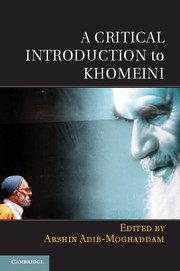Book contents
- Frontmatter
- Contents
- List of Map and Figures
- About the Authors
- Acknowledgments
- Glossary
- Timeline: The Life of Ayatollah Ruhollah Khomeini (1902–1989)
- Introduction Ayatollah Ruhollah Khomeini: A Clerical Revolutionary?
- 1 Khomeini and the “White Revolution”
- 2 The Rise of Khomeinism
- 3 Wilayat al-Faqih and the Meaning of Islamic Government
- 4 Ayatollah Khomeini’s Rule of the Guardian Jurist
- 5 Khatt-e Imam
- 6 Khomeini and the West
- 7 Gendered Khomeini
- 8 Hidden Khomeini
- 9 The Divine, the People, and the Faqih
- 10 Khomeini’s Legacy on Women’s Rights and Roles in the Islamic Republic of Iran
- 11 To Rule, or Not to Rule? An Alternative Look at the Political Life of Ayatollah Khomeini between 1960 and 1980
- 12 Khomeini and the Decolonization of the Political
- 13 Contentious Legacies of the Ayatollah
- Further Reading
- Index
- References
6 - Khomeini and the West
Published online by Cambridge University Press: 05 June 2014
- Frontmatter
- Contents
- List of Map and Figures
- About the Authors
- Acknowledgments
- Glossary
- Timeline: The Life of Ayatollah Ruhollah Khomeini (1902–1989)
- Introduction Ayatollah Ruhollah Khomeini: A Clerical Revolutionary?
- 1 Khomeini and the “White Revolution”
- 2 The Rise of Khomeinism
- 3 Wilayat al-Faqih and the Meaning of Islamic Government
- 4 Ayatollah Khomeini’s Rule of the Guardian Jurist
- 5 Khatt-e Imam
- 6 Khomeini and the West
- 7 Gendered Khomeini
- 8 Hidden Khomeini
- 9 The Divine, the People, and the Faqih
- 10 Khomeini’s Legacy on Women’s Rights and Roles in the Islamic Republic of Iran
- 11 To Rule, or Not to Rule? An Alternative Look at the Political Life of Ayatollah Khomeini between 1960 and 1980
- 12 Khomeini and the Decolonization of the Political
- 13 Contentious Legacies of the Ayatollah
- Further Reading
- Index
- References
Summary
One of the most salient aspects of Ayatollah Khomeini’s thoughts and revolutionary discourse was his view of the West. Within the context that he articulated these ideas, Khomeini’s position toward the generic West – gharb – did not represent a radical departure from the standard position of the Iranian left toward what was commonly perceived as a source of neocolonial domination. Similarly, Khomeini did not necessarily offer a starkly unique interpretation of what position the West occupied in relation to Iran and the rest of the Third World. But Khomeini’s position and pronouncements toward the West were undoubtedly one of the most central elements – if not the central element – in his revolutionary discourse that catapulted his views to dominance within Iran’s revolutionary movement of the late 1970s. In essence, Ayatollah Khomeini was the right person at the right time, who said the right things as a haphazard political movement to oppose the Pahlavi regime began to coalesce into a revolution.
That the Ayatollah had from the very beginning been consistent in his stances on a number of fundamental political issues only enhanced his credibility and revolutionary credentials in the eyes of his growing throngs of supporters. As the snowballing revolution smashed away the pillars of the old regime, and Khomeini found himself leading the revolutionary tidal wave both before and especially after the formal collapse of the Pahlavi dynasty, his steadfast opposition to what the West had come to symbolize helped consolidate his revolutionary leadership and command of the faithful. For more than a decade after the revolution of 1979, Khomeini politically operationalized his conceptions of the West; using it to fend off enemies near and far, real and imagined, as they encroached on and sought to undermine his revolutionary project. Until his death on June 3 1989, the West, as both a philosophical concept and an actual entity which interacted with Iran, remained elemental to the Ayatollah’s thoughts, discourse and politics.
- Type
- Chapter
- Information
- A Critical Introduction to Khomeini , pp. 149 - 169Publisher: Cambridge University PressPrint publication year: 2014
References
- 5
- Cited by



